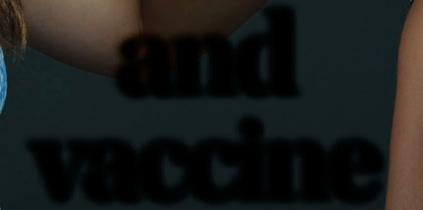
11 minute read
Covid Update
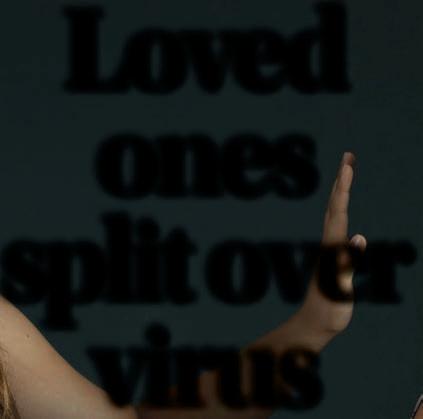
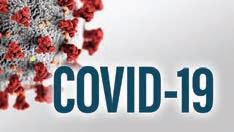
Advertisement


ACCORDING to a new poll, one in ve people in Ireland have distanced themselves from family or friends due to a disagreement about the Covid-19 pandemic.
An opinion poll carried out for thejournal.ie by Red C Research found 39% of people had disagreements with friends or family about how to behave during the pandemic and 39% had disagreements about Covid-19 vaccines. ose in younger age groups were more likely to have had a disagreement about the pandemic or Covid-19 vaccines.
More than half of those aged 18-24 fell out with family or friends about how to behave during the pandemic and 30% of people in this group have distanced themselves from family or friends as a result.
Almost half of those aged 3544 said they had argued with a family member or friend about Covid vaccines.
Just 10% of those aged over 65 have distanced themselves from family or friends due to disagreements about the pandemic. ere was little di erence between male and female responses, with 20% of both males and females who were surveyed stating that they had distanced themselves from a loved one.
Women were slightly more likely to have had a disagreement about Covid vaccines with a friend or family member. is month a more signi cant period of easing restrictions began, with the return of live music and larger indoor events – albeit with capacity limits in place and a requirement to show proof of immunity in indoor settings. e next signi cant date for the easing of restrictions is September 20, when organised indoor group activities such as sports and dance classes can resume. is date will also signal the return to workplaces on a phased and staggered basis.
According to the latest Amárach public opinion survey, carried out in conjunction with the Department of Health and published last week, 61% of people believe the reaction of the government to the pandemic is appropriate, while 22% believe it is insu cient and 17% believe it is too extreme.
One third of people surveyed said they think Ireland is trying to return to normal too quickly, with 45% stating they thought easing was moving at about the right pace and 23% said the return to normal was moving too slowly.
From October 22 onwards, the majority of remaining Covid restrictions will be lifted including the requirements for physical distancing and wearing masks in indoor private settings.

Loved ones split over virus and vaccine
Under-12s worst a ected since returning to school

CHILDREN between the ages of ve and 12 have been the most a ected by Covid-19 since their return to schools.
During the rst week back to school, there were 3,292 cases among children up to the age of 18, according to new data released by the HPSC (Health Protection Surveillance Centre).
Of these, 1,461 cases were in the ve- to 12-year-olds group, compared to 1,247 cases in the 13- to 18-year-old group and 644 in those aged up to four.
At the start of September, the HSE said nearly 12,000 schoolchildren were out of class because they were a close contact of someone with Covid-19,
A new plan sets out steps to end mass testing for Covid, starting with children
It comes as an infectious disease specialist said she fears most children under 12 in Ireland will contract Covid-19 by early next year if more isn’t done to make schools safer.
Prof Cliona Ni Cheallaigh, a consultant in St James’s Hospital, also said the country is letting the disease “rip through primary schools”.
“ at said, we’ve got Delta, everybody under 12 is not vaccinated, and they’re in classrooms with no masks and there hasn’t really been the type of work in ventilation done that would make the schools safer,” she told RTÉ Radio earlier this week.
“So if I were a betting woman, I would probably be betting that most kids in Ireland under 12 will be getting Covid before the spring, the way we’re going on now.”
Her view was not shared by HSE chief Paul Reid. “If you look at the cases that we have had, it’s a much smaller percentage than total children in school,” he said on RTÉ Radio One’s is Week
He added that what is happening in schools at the moment is what the HSE would have projected.

Vaccine booster jabs ‘not right’, says WHO chief
THE head of the World Health Organisation (WHO) is once again calling for wealthy countries to postpone the rollout of Covid-19 vaccine boosters.
Instead, Director-General Tedros Adhanom Ghebreyesus said at a press brie ng earlier this week that richer nations should distribute extra doses to lowincome countries facing vaccine shortages, especially those in Africa where less than 3.7% of people are fully vaccinated.
It is the third time Tedros has spoken against vaccine booster shots being distributed by wealthy nations, calling for a pause on distribution of the third shots through the end of September and then through the end of the year.
In Africa, vaccinations against the virus are low because many poorer nations on the continent do not have enough doses or the infrastructure necessary to put together a massive operation the way many wealthier nations have.
African countries have fallen way behind the global vaccine pace. Chad is among the worst, with less than half-of-a-percent of residents having received at least one shot of a vaccine. Less than 6% of Africans have gotten at least one shot overall.
400 children con rmed after restrictions lifted
FOR the rst time in living memory, Kilkenny GAA allowed con rmations to go ahead in the county grounds when 400 primary school children received the sacrament last ursday. e hour-long ceremony was held at Nowlan Park, following the lifting of rigid Covid-19 restrictions.
Apostolic Administrator and Bishop of Ossory Denis Nulty and GAA o cials had been working on the logistics and organisation of holding the en masse con rmations for several months.
Plans to hold the ceremony on the pitch had to be moved to several of the stands in the grounds at the last minute due to the threat of rain, but that did not dampen the enthusiasm.
Up to 2,500 excited children and adults gathered at the grounds from 5.30pm.
Bishop Denis Nulty led proceedings from the pitch as the scoreboard told the story of the Saints winning out over the Sinners.
Don’t blame Covid for hospital waiting lists - Funchion
SINN Féin TD for Carlow Kilkenny, Kathleen Funchion has criticised the Taoiseach for putting spiralling hospital waiting lists down to the Covid-19 pandemic.
She said that the major rise in waiting times came before the pandemic, and is a result of a failed approach in health that over relies on private medicine.
Teachta Funchion said: “ e Taoiseach is fundamentally wrong to say that spiralling wait times are down to Covid-19.
“ e major increase from 385,781 in December 2014 to 556,770 in January 2020 cannot be blamed on the pandemic.
“St Luke’s Hospital which services Kilkenny and Carlow has seen its waiting lists increase by 21% since 2017 to just under 900 now waiting for an appointment.
“ e real e ect of Covid has yet to be felt from a major drop in referrals and other factors related to the pandemic.
“As normality resumes, we will see a tsunami of missed care swell waiting lists further as hospitals are already at capacity.
“I cannot see how this Government will x the problem if they don’t understand it.
“ e only solution to waiting lists is major investment in capacity measures as we will outline in our Alternative Budget this year.
“ at means more beds and, crucially, more sta , as well as major investment in IT modernisation to develop a centralised referral system and an integrated waiting list management system.
“I will also be proposing a major fund to expand theatre capacity and diagnostic equipment to boost hospital capacity to cut down waiting times.”
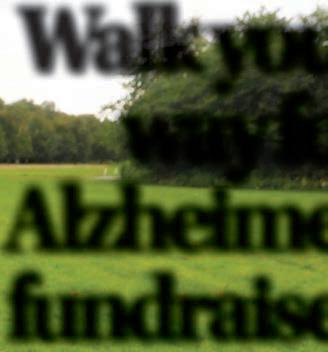

Scrap planned tax cuts calls ICTU

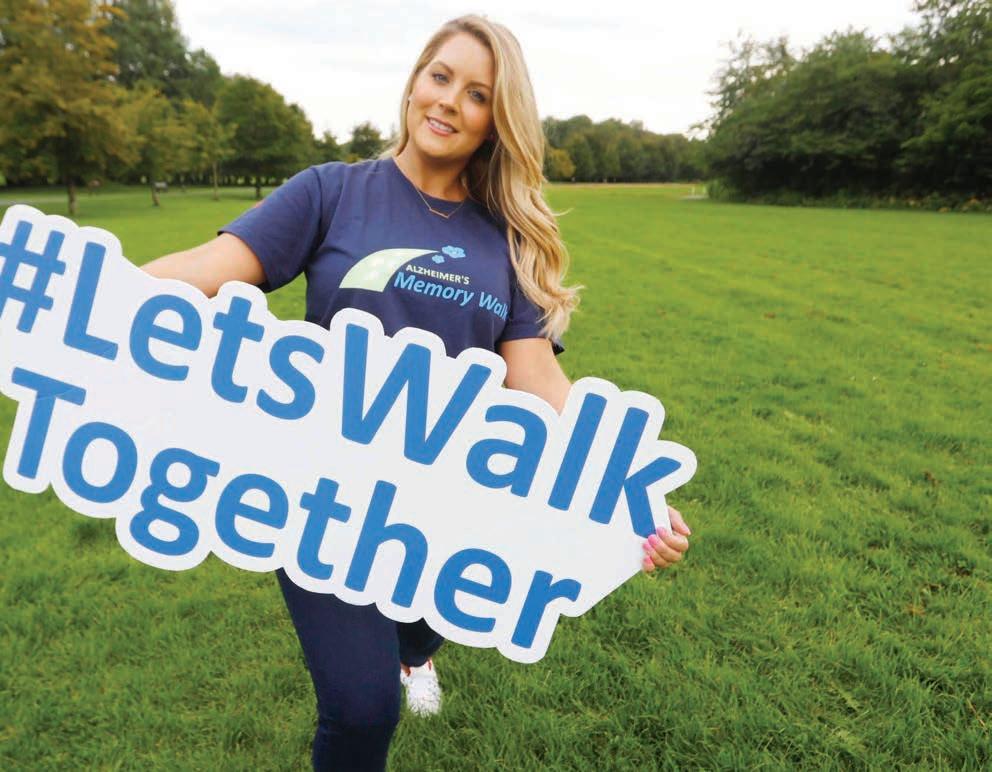
Walk your way for Alzheimer fundraiser
THE Irish Congress of Trade Unions (ICTU) has called on the Government to increase public spending and scrap planned tax cuts in its pre-Budget submission.
Calling the permanent cuts una ordable and unjusti ed the congress also said that increases in employer PRSI should be used to bolster “chronically low levels of Government revenue in Ireland”. However, it adds this should only begin when the economy is in recovery.
According to the union body, the pandemic has shown that basic services and the welfare state have proven themselves to be the indispensable bedrocks of people’s economic well being.
It welcomes the Government’s decision not to pursue an austerity strategy in the years ahead. However, it wants priority given to expenditure on housing, health, childcare and education and believes planned tax cuts should be abandoned.
It proposes that the Employment Wage Subsidy Scheme should become a permanent scheme to support employment in industries going through temporary downturns.
ICTU also wants to make bogus self-employment a criminal o ence.
Its pre-budget submission says job losses during the pandemic were concentrated amongst lower skilled workers, young workers and part-time workers.
Adding that the crisis showed up “weaknesses in Ireland’s pre-pandemic economic model” and that there should be no going back to the “old low tax and low spend model”.
It suggests the Brexit Adjustment Reserve be used to retrain workers.
ICTU also wants the minimum wage to be raised to €10.50 an hour from January as part of a commitment to reach the Living Wage of €12.30 an hour. Social welfare rates should also be given an above in ation rate increase. e submission recommends that the Government introduces statutory paid training leave for all workers.
Any business which avails of Government support schemes should be bound by commitments to labour laws and to promote collective bargaining, ICTU added. KILKENNY folk are being asked to make every step count for the second Virtual Alzheimer’s Memory Walk taking place this Sunday. e Memory Walk is for all ages and abilities to unite together with their families and communities to raise awareness and funds for dementia supports. ere are 1,413 people living with dementia in Co. Kilkenny and the Alzheimer Society Ireland is hoping that 5,000 walkers across Ireland will help them raise €250,000 for vital services to support them and their family carers through the Covid-19 public health emergency and the aftermath of the lockdown.
Virgin Media TV presenter Martin King, is a rm advocate for the charity. He shared his family connection with dementia in a moving documentary called ‘We Need to Talk About Dementia’, which formed part of the successful Donate for Dementia Week on Virgin Media TV last March, and received a warm reception for its honesty and sensitive portrayal of dementia. Martin’s mother, Christina, was diagnosed with dementia and passed away in 2019.
Pamela Laird, the former Dragons Den and the BBC’s Apprentice contestant, is also backing the event. Her father, Sylvester, was diagnosed with dementia in 2016, which has been challenging for her family to deal with especially during the pandemic.
Walk on your own, with your household or your pet dog, it’s guaranteed to be a feel-good and uplifting occasion. It’s up to you where you walk from the back garden to the local park – It’s Your Walk, Your Way. Family-friendly prices €7 for kids and €18 for adults.
Follow these 3 easy steps to take part: 1. Visit www. memorywalk.ie; 2. Register for your pack and tshirt; 3. Plan your route for Sunday, September 19.
Entrepreneur Pamela Laird issues rallying call to Kilkenny public.
Kilkenny volunteers tackle Beach Clean
OVER 100 volunteers will help tackle marine litter in County Kilkenny this weekend.
After a break in 2020, six volunteer groups have signed up for Clean Coasts’ Big Beach Clean 2021 and are ready to tackle litter in County Kilkenny. e event launches today and will run until Sunday, the same weekend as International Coastal Clean-up. is year sees the involvement of the National Spring Clean programme with registrations open nationwide to all residents of Ireland, no matter how far from the coast they are based. e Big Beach Clean is an annual call-to-action organised by Clean Coasts that calls volunteers from communities all over Ireland to get involved and remove litter from our beautiful coast at the end of the bathing season, as part of the International Coastal Clean-up (ICC), operated internationally by Ocean Conservancy.
e initiative is also an opportunity for the over 100 registered volunteers to get involved in a worldwide citizen science project, which will entail collecting the amount and types of litter on Irish beaches and lling in Clean Coasts’ Marine Litter Data Cards that will help heighten awareness about the issue of marine litter serving as an indicator of the magnitude of the problem.
For more information visit www.cleancoasts/org.









